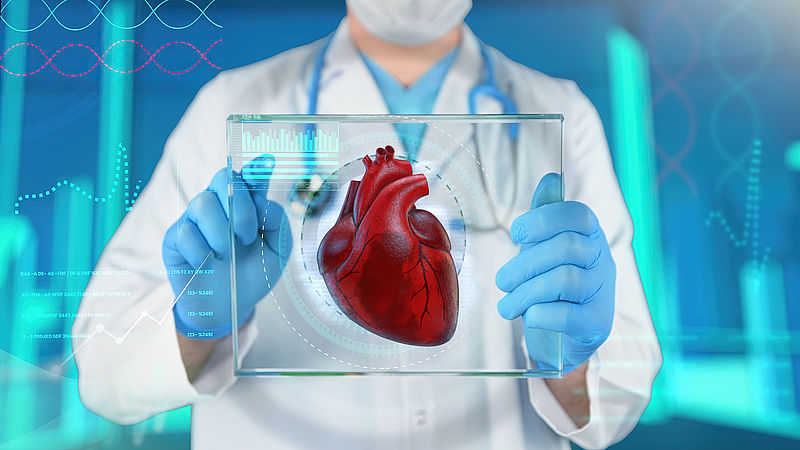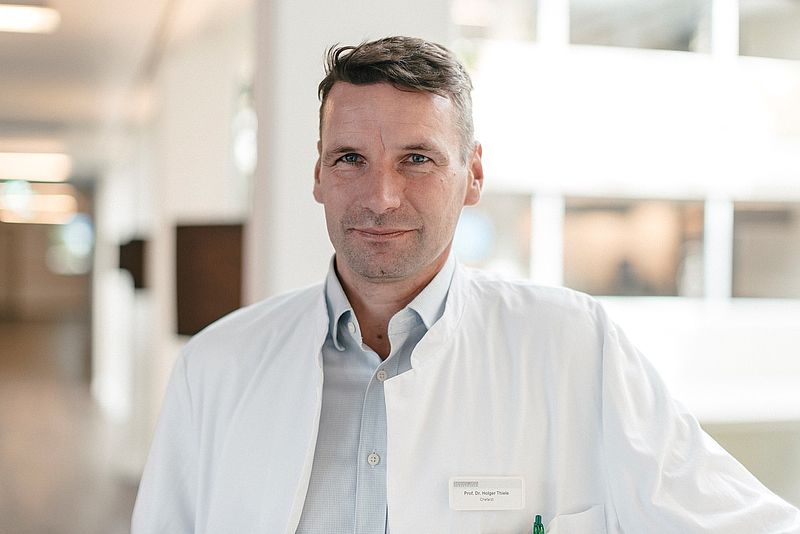Since 2010, the pediatric cardiologist PD Dr. Boris Schmitt and his team at the German Heart Institute Berlin (DHZB) and Charité - Universitymedicine Berlin have been researchingvalve implants that last a lifetime and can be implanted minimally invasive. To do this, the researchers excise a piece of the autologous pericardium and use 3D data from MRI or CT to shape a new, patient-specific valve for the patient. In sheep, they have already achieved excellent long-term results with such an autologous pulmonary valve implant .
With the GECT-DZHK28* study, the researchers are now investigating, for the first time in humans, whether such an autologousheart valve can be used safely. Seven young adults with a congenital pulmonary valve defect will participate in this safety study. The patients will be examined every three months during the first year after the valve implant has been minimally invasively implanted using a catheter. In total, the follow-up period will last five years. If the study is successful, the management plans a larger subsequent study in which, in addition to 15 adults, ten children should participate and receive a heart valve constructed of their own tissue. The aim is to determine whether the results are representative and can be generalized.
Potential of 400,000 new heart valves per year
For their vision of a heart valve that grows with the patient, Schmitt and his colleagues founded the medical technology company GrOwnValve several years ago. "Our background is in pediatric cardiology, where a narrowed pulmonary valve is a common congenital heart defect," Schmitt says. With 130 million children born worldwide each year, there are 1.3 million children with heart defects, of which about 290,000 involve the pulmonary valve, either because of a valve defect or because of a more complex condition.
On average, these children require multiple surgeries every four to five years. The implants currently used, which are made from bovine or porcine tissue, cause immune reactions that, over time, damage the valve to such an extent that it must be replaced. Replacement valves made of metal or plastic last much longer but can cause dangerous blood clots (thromboses). Patients must therefore take anticoagulant medication for the rest of their lives. The permanent use of these "blood thinners" or repeated valve implantations is a great physical strain and a problem in adulthood, especially for risk groups such as pregnant women or the elderly.
Regenerative and adaptive
For Schmitt and his colleagues, the DZHK study is an important step toward a heart valve that grows with the patient. They will soon investigate whether this can succeed in young animals. "So far, we have seen in adult animals that the inserted valve made of autologous tissue is regenerative, i.e., can renew itself independently. It shows characteristics of living tissue and can adapt to conditions in the patient. For example, the valve strengthens in places where it has to withstand more pressure," Schmitt says. "We also see a closed layer of cells on the valve surfaces, which are encouraging results."
"Our dream is to be able to help children with heart disease all over the world with our valve," says Boris Schmitt, describing the long-term vision of the research project. "The first-in-human study we are starting now will provide important insights into how the valve is accepted in the human body in the first years after surgery."
* Study title: A First-in-Human Feasibility Study to Evaluate the Safety (and Short-term Effectiveness) of the Autologous GrOwnValve Transcatheter Pulmonary Heart Valve GECT-DZHK28
Study director: PD Dr. Boris Schmitt, German Heart Institute Berlin, schmitt(at)DHZB.de,
Charité - Universitätsmedizin Berlin, boris.schmitt(at)charite.de
Durable and adaptable for life - DZHK study tests heart valves made of autologous tissue (GECT-DZHK28 study)
Contact: Christine Vollgraf, Press and Public Relations, German Center for Cardiovascular Research (DZHK), Tel: 030 3465 529 02, presse(at)dzhk.de.



